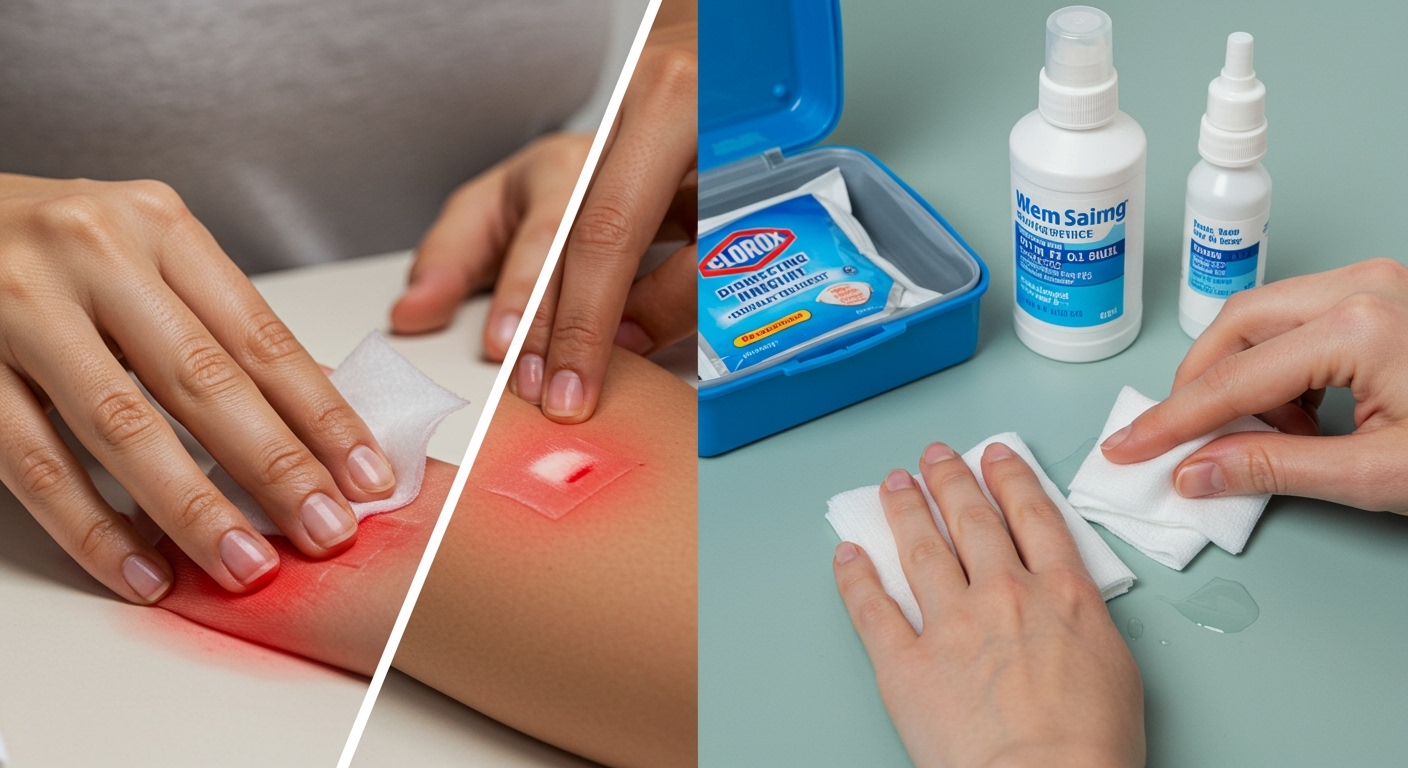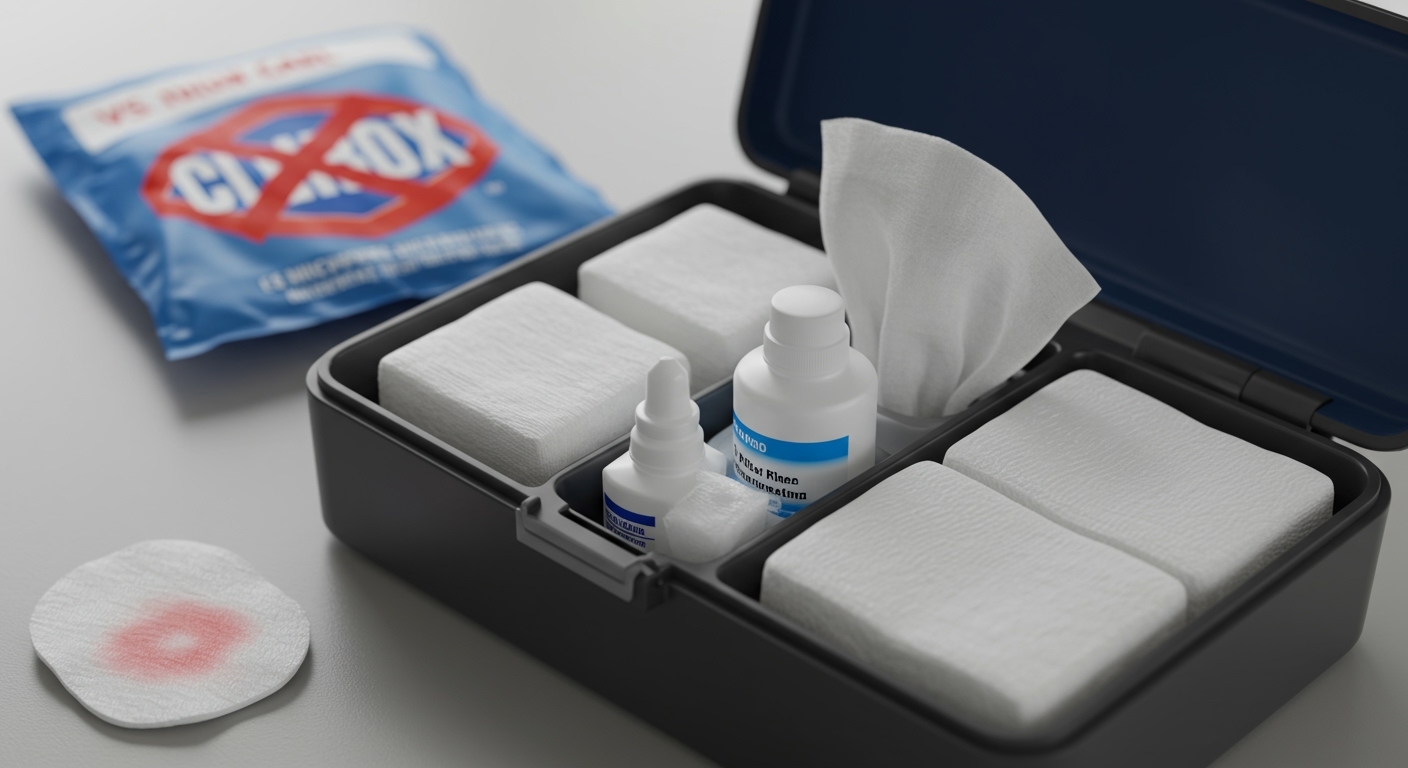Can You Use a Clorox Wipe on a Wound? The Answer is No
Sep 29th 2025
Clorox wipes are kept by many people in their houses to do quick cleaning. These wipes are applicable in disinfecting tables, counters and other hard surfaces. But can you use Clorox wipes on an open wound when you need to clean a cut in a hurry? The straightforward answer to this is no, such wipes are aimed at removing the germs on the surface, but not to treat wounding. Wound areas should not be wiped with Clorox as this poses a severe health hazard. The World Health Organization (WHO) reports that improper wound care may contribute to sepsis, resulting in numerous deaths per year, approximately 11 million. Safe wound treatment can not be substituted by a household cleaner. Treating wounds with a surface disinfectant may only worsen the injury.
Why You Should Never Use Disinfectant Wipes on Skin
Treatment of scrapes and cuts should use products that are meant to be used by human beings. Wipes such as Clorox disinfectants are powerful enough to disinfect the tables and door handles but not the living tissues. Knowing the major dissimilarities will assist in understanding why clorox disinfecting wipes safe on skin is a burning question for every household.
Harsh Chemicals vs. Delicate Tissue
Clorox cleansers include bleach-based chemicals which kill bacteria on non-porous surfaces. These wipes apply to glass, metal or plastic, however human skin is quite different. Clorox wipes when used on the wound site may result in burns, rushes, and slow healing. Skin near a cut is delicate, and it is capable of absorbing harsh substances. WHO wound care guidelines never suggest cleaning products as antiseptics; they all suggest using gentle ones. Industrial chemicals such as bleach damage body tissue and increase risk of infections.
The Difference Between Surface Disinfectants and Antiseptics
Disinfectants such as Clorox are made for hard surfaces like tables and sinks. They are tested for killing germs on materials that do not absorb chemicals. Antiseptics, like alcohol prep pads or medical cleaning wipes, are created for direct use on human skin. This difference matters when treating injuries. Using a clorox wipe on wound areas exposes delicate tissue to chemicals that are never meant for the body. Always use antiseptics or sterile solutions to clean wounds to stay safe.
What Happens if You Use Clorox Wipes on Skin?
Ointing with these wipes on the wound tissue may provoke unwelcome responses causing harm to the tissue. Possible effects include:
- Burns to the skin caused by chemicals.
- Rashes, reddening, or itching around the cut.
- Slower wound healing, which is caused by chemical irritation.
Studies in the Journal of Hospital Infection indicate that disinfectant and its use can also promote resistance bacteria when misused. In cases when bacteria are able to survive harsh chemicals, they might be more difficult to treat. It becomes even more hazardous to clean with these wipes. Safer products, such as Covidien Curity alcohol prep pads or other medical wipes are safer. They are designed to contact the skin and support proper healing.
Safe Alternatives for Cleaning Wounds
Safe wound care is simple and uses gentle, medical-grade products. Instead of asking are Clorox disinfecting wipes safe on skin, follow these options recommended by health experts.
Sterile Saline or Water
The gold standard of cleaning the cuts and scrape is with the use of sterile saline. It does not harm delicate tissue but removes dirt and bacteria. In the absence of saline, sterile bottled water may be used. Water eliminates debris without damaging the natural skin barrier. Sterile solutions are extremely important to minimize the risks of infections.
Mild Soap
In case of minor cuts, mild soap and clean water can be used quite effectively. This action decreases both germs and prevents infection. Never leave any residue of soap and dry it using a clean cloth. Mild soap lacks harsh chemicals, such as bleach, thus, keeps wounds safe.
Antiseptic Wipes Designed for Skin
On-the-go cleaning is most efficiently performed using medical-grade antiseptic wipes. Such wipes contain no alcohol, or use gentle antiseptics for sensitive skin. They clean wounds and do not burn or irritate them. Products like alcohol prep pads are made specifically for patient use. Unlike Clorox wipes on wound tissue, these wipes protect healing cells. The global demand for medical antiseptic wipes is rising. Market Data Forecast reports a value of USD 4.3 billion in 2023, with steady growth expected due to hygiene awareness.
Why Clorox Wipes Are Unsafe for Any Skin Contact
Many people wonder about wiping face with Clorox wipes for quick cleaning. This is also unsafe. The facial skin is even more sensitive than other areas. Several chemicals present in Clorox wipes may result in long term damage, peeling, and stinging. Applying them to the wound exacerbates the situation since the open tissue is more rapid in taking up chemicals. Household cleaning products are not designed to be used on people. Look at the label and read carefully to prevent unintentional injuries.
Conclusion
The use of Clorox wipes on scrapes or cuts is never safe. The chemicals used to clean kitchen counters may cause severe harm to living tissue. Correct wound care is based on medical antiseptics, sterile saline, and mild soap, other than surface disinfectants. The use of harmless options prevents infection and preserves a rapid recovery. To ensure wound care, always choose medical grade products that are intended to be used in contact with the skin rather than household cleaning wipes.
Do not risk your health with surface cleaners. Do not use Clorox wipes on the wound; instead, use medical antiseptic. See reputable sources of alcohol prep pads, sterile saline and licensed wound care supplies. Keep your skin safe, infection-free and healing, with safe solutions designed for humans.



